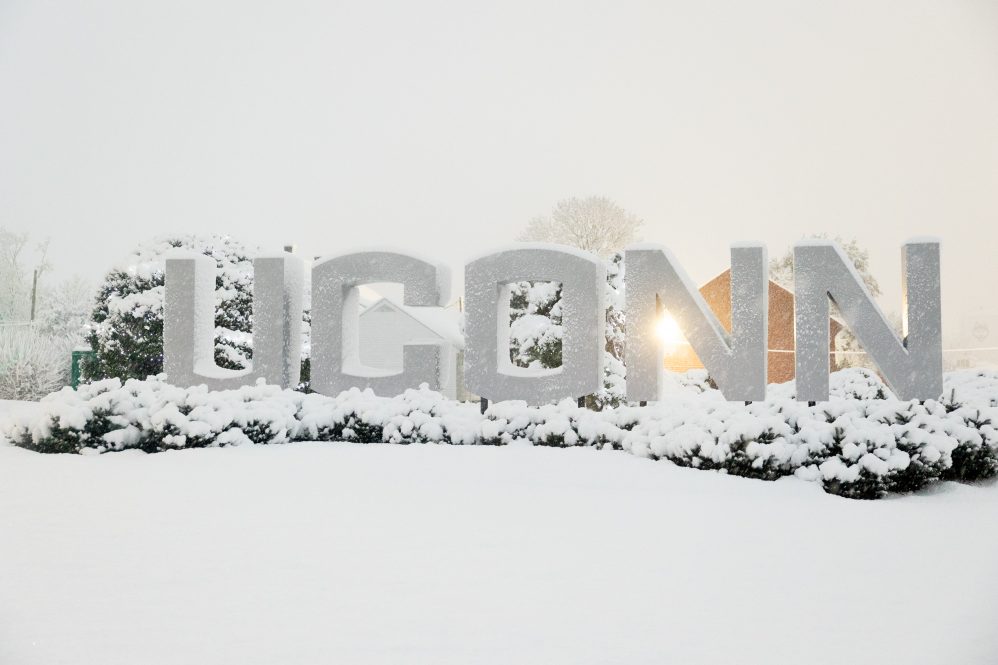UConn will hold its tuition rate flat for the 2025-26 fiscal year while it reviews other ways to raise revenue, increase operating efficiencies, and protect the academic enterprise while continuing to ensure access for talented students.
The UConn Board of Trustees on Wednesday adjusted several fees to meet the increasing costs of providing student housing, meal plans, and services such as student activities, health programs, classroom tech, and transit services.
However, trustees left UConn’s tuition rate unchanged for the 2025-26 academic year, which starts July 1, 2025. It will be the first academic year without a tuition increase at UConn since 2000.
Trustees and administrators say the decision to keep tuition flat recognizes that families and students face fiscal constraints and demonstrates that the University is committed to offering a world-class education at an affordable price.
UConn also is keeping its fee increases lower than the amounts that would be needed to fully meet rising costs and is subsidizing part of those costs with other funds to reduce the impact on students and their families.
“Our focus is to ensure that UConn remains an economic value as we continue to address the budget deficits that we are projecting into future years,” Jeffrey Geoghegan, UConn’s chief financial officer and executive vice president for finance, told participants at a recent Town Hall meeting on the fee proposals.
“We continue to look at our overall enrollment growth, philanthropy, and our external grants and partnerships while we also continue to work on reducing costs around the University,” he said. “Our focus will be to maintain our high quality of education and student support services.”
UConn had previously adjusted housing and dining fees for the current 2024-25 academic year to meet increased costs of commodities and rental market inflation but kept all other fees unchanged at last year’s levels.
UConn’s guiding principles when setting fees are to protect affordability by increasing them only when absolutely necessary to cover increased costs, to promote simplicity and transparency so the fees can be easily understood, and to use the revenue to help ensure financial stability and quality of the programming it funds.
For Storrs-based undergraduate students who do not live on campus, the mandatory fees will increase about $292 in the next academic year.
If the University had passed along all of the inflationary increases via the fees, the increase to those students would have been $520.
The fee increase for regional campus commuter students will be about $112 in the coming academic year. Fee rates are lower at the regional campuses because those students do not have regular access to some of the Storrs-based services.
Separately, the cost of Storrs-based student housing for the most common residential and dining plans will increase $396 in the 2025-26 academic year to meet increased inflationary and commodities costs.
The trustees’ Financial Affairs Committee had endorsed the fee proposal Tuesday, and it was presented at town halls in person and online on Nov. 13 with opportunities for participants to ask administrators about specific elements.
Even when accounting for the fee adjustments approved Wednesday, reviews consistently show that UConn offers academic excellence at a significant value for Connecticut residents compared with the amounts they would pay if they attended many competing institutions.
Among a group of 13 schools against which UConn directly competes for applicants who receive enrollment offers, 10 have higher room and board rates, including several flagship institutions.
A large number of UConn students’ costs are also reduced by financial aid, with almost three-quarters of UConn’s undergraduates receiving some form of gift aid they do not have to repay.
Every student fee category at UConn correlates to specific services funded by that revenue. Those slated to increase in 2025-26 are:
• The General University Fee (GUF), which pays for extracurricular and co-curricular offerings such as career services, the One Card Office, cultural centers, student organizations, athletics tickets, the UConn Marching Band, Fraternity and Sorority Development, and others.
• Student Health & Wellness, which provides a comprehensive range of services including medical treatment, mental health programming, a pharmacy, preventive care and health screenings, immunizations, sports and travel medicine, an allergy clinic, and others.
• Infrastructure Maintenance, which directly supports maintenance costs for classrooms, buildings, and infrastructure, including preventive maintenance that helps drive down operational expenses.
• The Transit Fee, which funds the campus bus service and provides students with access to the state’s UPass program, which allows them to ride state-operated buses and trains without charge throughout Connecticut.
• The Technology Fee, which helps pay for classroom technology for students’ multimodal learning, software for teaching and learning, media-related library services, Microsoft 360, and related services.
• Student Activity Fees, which are collected by the University but then passed through in their entirety to the student governments at each campus. Those entities review and act on requests for increased funding from student groups.
• Visa Compliance, a fee paid only by enrolled students on University-sponsored F-1 and J-1 visas. The fee hasn’t increased since its inception in 2017, but costs to the University to provide services to those international students have gone up each year.
Fees also were adjusted Wednesday for graduate students, with the financial impact varying depending on whether they are graduate assistants who receive teaching stipends, live in UConn-run student housing, and are based at Storrs or a regional campus.



